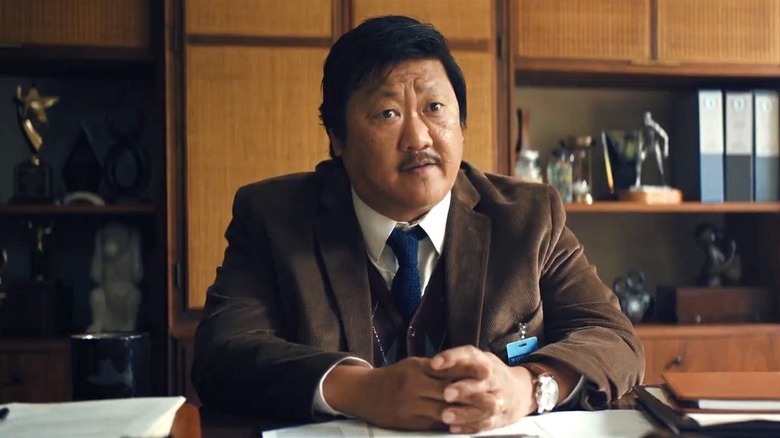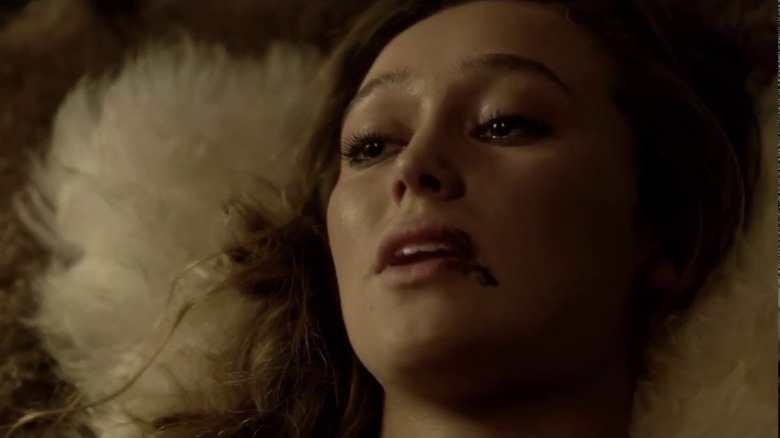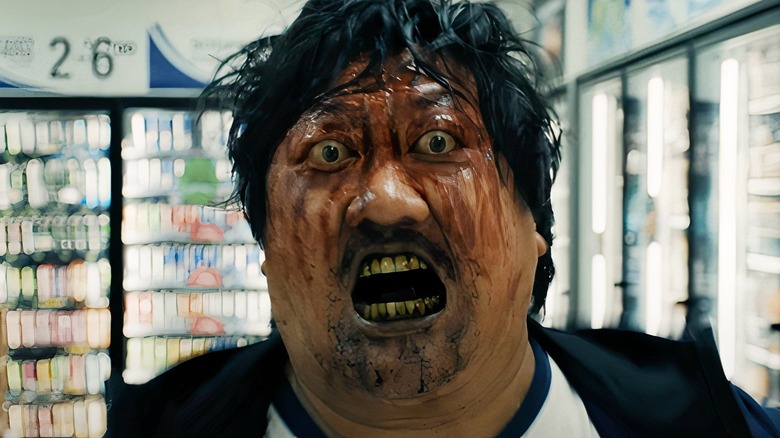Weapons' Only Major Flaw Is This Overdone Trope
Contains spoilers for "Weapons"
Zach Cregger's mystery-horror film "Weapons" is a breakout hit, blowing critics and moviegoers away with its shocking twists, evocative themes, and skillfully deployed scares. Audrey Fox's review of "Weapons" for Looper explains many of the film's strengths that turned it into an instant sensation. However, as great as the movie is at creating an intentional sense of unease, there is one issue with it that has been causing discomfort for less intentional reasons: The two most brutal and gory death scenes involve the film's only two openly gay characters, fitting into the much-loathed "bury your gays" trope.
The characters in question are Marcus Miller (Benedict Wong), the school principal, and his husband Terry (Clayton Farris). When Gladys (Amy Madigan), the film's villain, visits them at their house and does her witchcraft, Marcus is turned into a "weapon," vomiting black goo onto Terry and repeatedly headbutting him until his skull caves in. Gladys then sends the weaponized Marcus after Justine Gandy (Julia Garner), the third grade teacher he'd placed on leave. Marcus gets his own head smashed up by an oncoming car, complete with brains and other viscera oozing out.
Terry and Marcus are not the only characters to die in "Weapons," but their deaths are by far the most painful to watch, between the endless overkill of Terry's murder and the graphic gore of Marcus' accident. While it would be wrong to call the film homophobic in and of itself, it fits an unfortunate pattern in media where gay characters are more often subjected to extreme tragedy than straight ones.
The Bury Your Gays trope explained
For much of film history, LGBTQ+ characters were not expected to survive to the end of any movie. The Hayes code from the 1930s through the 1960s prohibited the portrayal of openly gay characters, and many queer-coded characters were featured as villains, from Dr. Pretorious in "Bride of Frankenstein" to Bruno in "Strangers on a Train," and were either locked up or killed off. In later decades, more open sympathetic portrayals of queer characters appeared in movies, but these still tended to end in tragedy.
On some level, this pattern is understandable: From hate crimes to the AIDS crisis, the LGBTQ+ community has suffered many tragedies, and depictions of such tragedies in great LGBTQ+-focused films such as "Philadelphia," "Boys Don't Cry," and "Brokeback Mountain" have helped open hearts and minds to real struggles. It's when the pattern becomes overwhelming, where depictions of queer suffering completely outweigh depictions of queer survival and queer joy, that the "bury your gays" trope becomes an issue. Backlash to "bury your gays" reached a fever pitch in the mid-2010s due to anger over TV shows like "The 100" killing off popular lesbian characters. A 2016 study from Autostraddle found lesbian and bi women on TV were over three times more likely to be killed off than to have happy endings.
Avoiding one uncomfortable issue lead to another
How the "bury your gays" trope applies to horror — a genre where characters of all sexualities are likely to die — is an interesting debate. Is something like "The Last of Us" or "Knock at the Cabin" being problematic when it kills off gay characters, or transcending the problem by treating gay people the way horror movies also treat straight people? "Weapons" feels like a more problematic "bury your gays" case because, whether intentionally or not, there is a double standard in how extreme the gay characters' deaths are in comparison with the straight characters.
Curiously, in a leaked early draft of the screenplay, Marcus (then named Andrew) did not have a husband, but instead a wife named Ginny. The description of Ginny's death isn't as graphic as what made it onscreen with Terry, but it's possible the filmmakers determined watching a husband murder a wife would be too upsetting in terms of gendered violence. That would leave two options to keep the scene while avoiding the violence against women issue: Switch the characters' genders, or make them a gay couple. Since Marcus needs to be bulky enough that even Archer Graff (Josh Brolin) can't stop him, it made the most sense for Marcus and his partner to both be men.
It's reasonable to think that two or three years ago, the filmmakers might have felt the "bury your gays" trope had been defanged by greater representation across the board. In 2025, however, when LGBTQ+-led shows are at higher risk of cancelation and movie studios are censoring representation, it stings more than it might have otherwise.


